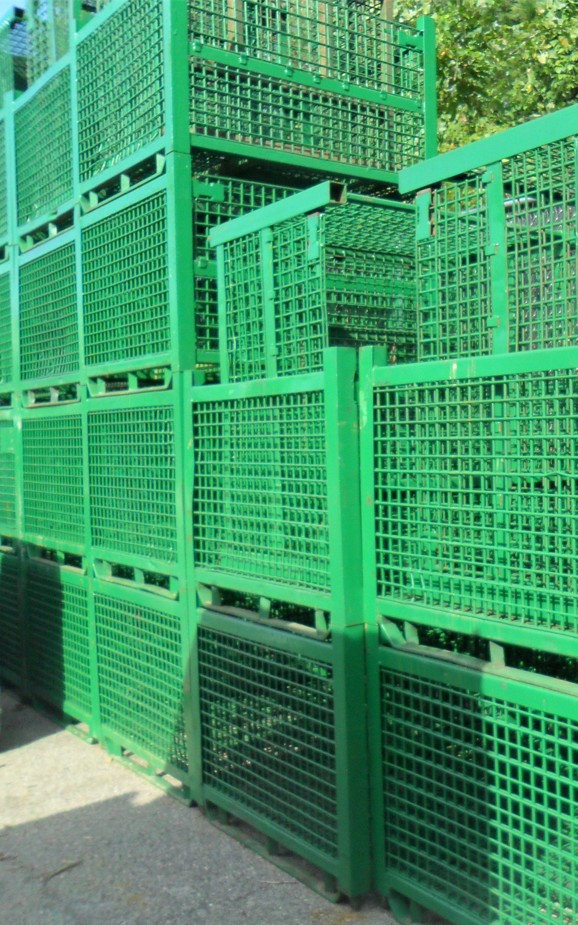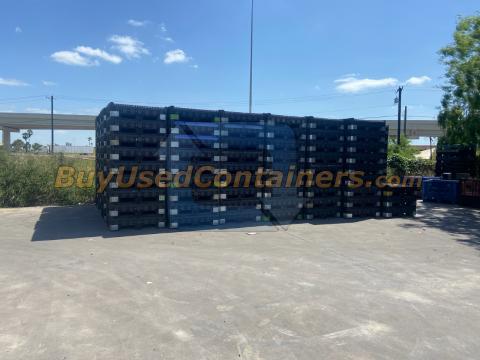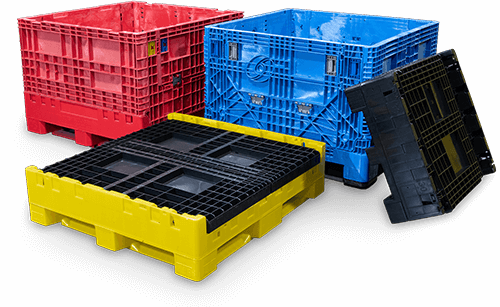Why Mass Containers Are Crucial for Affordable and lasting Transportation
Bulk containers play a vital function in contemporary logistics. They promote the efficient movement of large amounts of goods, consequently enhancing transportation processes. This method not just lowers costs however additionally lessens ecological impact via lower exhausts and waste generation. As sectors seek even more sustainable techniques, the fostering of bulk containers is coming to be increasingly considerable. What implications does this change hold for future logistics and supply chain monitoring?

The Benefits of Making Use Of Bulk Containers in Logistics
Mass containers transform logistics by boosting efficiency and sustainability. These containers permit for the transportation of large amounts of products in a solitary trip, substantially decreasing the number of trips required. This not only enhances operations however additionally minimizes labor costs linked with handling, packing, and discharging. Additionally, bulk containers are designed to enhance area application within transportation cars, guaranteeing that more items can be delivered at the same time.
The standardization of mass containers also simplifies the logistics process. With consistent dimensions, they can be quickly stacked and saved, resulting in improved storehouse administration. Bulk containers usually include long lasting products that shield contents from damages throughout transit, therefore reducing item loss and increasing general dependability. As an outcome, organizations can experience boosted supply chain performance, inevitably causing raised success and client contentment. This mix of variables makes bulk containers an important asset in contemporary logistics.
Ecological Impact: Decreasing Waste and Carbon Impact
As industries progressively focus on sustainability, the adoption of mass containers has become a vital method for minimizing waste and lowering carbon footprints. These containers decrease using packaging materials, such as boxes and plastic, consequently notably lowering total waste generation. By combining deliveries, bulk containers enhance transportation effectiveness, enabling more items to be transferred per trip. This decrease in journeys directly correlates with lower greenhouse gas discharges, adding to a smaller carbon impact.
Moreover, mass containers can commonly be recycled or recycled, better reducing environmental effect. The longevity of these containers guarantees they can withstand several transport cycles, lowering the requirement for single-use options. used collapsible bulk containers. By streamlining logistics and promoting efficient source usage, mass containers not just support sustainable methods however additionally encourage markets to line up with worldwide ecological goals. Eventually, their implementation mirrors a dedication to environmental stewardship and accountable resource administration
Cost Financial Savings: How Bulk Containers Lower Transportation Expenditures
While numerous companies seek ways to improve their bottom line, making use of mass containers offers a substantial opportunity for reducing transport expenses. Mass containers make the most of the volume of products transported, allowing companies to deliver larger amounts at when. This effectiveness lowers the number of trips needed, straight reducing fuel costs and decreasing labor costs connected with loading and discharging.
Additionally, mass containers often feature streamlined styles that enhance room utilization within transportation cars. This suggests fewer vacant areas, leading to a lot more efficient use readily available capacity. The sturdiness of mass containers can decrease the risk of product damage during transit, decreasing losses and making certain that more goods get here intact.
Enhancing Supply Chain Efficiency With Bulk Storage Space Solutions
Bulk storage space options play an essential function in improving supply chain effectiveness by optimizing stock monitoring. By combining products right into fewer, bigger containers, organizations can considerably decrease dealing with prices connected with regular transfers and processing. This structured method permits much better monitoring and administration of inventory, eventually bring about improved functional efficiency.
Structured Inventory Administration
Effective stock administration is important for optimizing supply chain procedures, specifically when companies adopt bulk storage remedies. These solutions allow organizations to preserve greater stock levels while reducing the frequency of replenishment. By settling materials into bulk containers, companies can enhance their inventory processes, lowering the complexity related to tracking multiple smaller bundles. This approach promotes exact stock matters and enhances forecasting accuracy, allowing for even more educated decision-making. In addition, bulk storage solutions simplify storehouse company, making it easier to locate and gain access to items when required. As an outcome, organizations can attain an extra efficient inventory turn over rate, ultimately boosting total supply chain performance and reducing the likelihood of stockouts or overstock circumstances.

Minimized Handling Expenses
The execution of bulk storage space solutions not just simplifies supply administration yet additionally significantly lowers handling expenses across the supply chain. By consolidating products into mass containers, companies reduce the demand for frequent handling and transfer between various storage and transportation units. This method reduces labor expenses connected with loading, dumping, and relocating smaller sized bundles. Furthermore, bulk storage minimizes the frequency of deliveries, leading to lower transportation costs and lowered gas consumption. Because of this, companies can maximize their logistics procedures, enabling a more effective allocation of resources. Eventually, decreased taking care of prices contribute to boosted total supply chain performance, cultivating an atmosphere that sustains both sustainability and economic stability.

Convenience of Bulk Containers Throughout Various Industries
Although several industries have unique demands for transport and storage space, mass containers have actually become a versatile solution that satisfies a broad variety of demands. These containers, varying from large containers to specialized tanks, can fit varied products, consisting of powders, fluids, and granules. In the agricultural field, mass containers assist in the transportation of fertilizers and grains, while the food and drink market utilizes them for components and finished products. The chemical sector depends on bulk containers for safely delivering unsafe products, ensuring compliance with safety and security laws. Furthermore, building and construction firms profit from mass containers for carrying aggregates and various other products. Their adaptability extends to numerous settings of transportation, including trains, ships, and vehicles, enhancing logistical effectiveness. This versatility not just streamlines procedures across different industries however additionally advertises sustainability by reducing packaging waste and optimizing area en route. Mass containers play a crucial role in contemporary supply chain administration.
Future Fads in Bulk Container Use and Sustainability
The future of mass container use is significantly formed by innovative materials check here advancement that improves sustainability. Furthermore, automation in logistics guarantees to simplify operations, minimizing waste and improving efficiency. Embracing circular economic situation practices will certainly even more change exactly how bulk containers are created, made use of, and reused, fostering a much more sustainable transportation landscape.
Innovative Materials Development
As markets progressively prioritize sustainability, ingenious products growth in bulk containers becomes a substantial consider boosting green transportation solutions. Makers and researchers are checking out biodegradable plastics, recycled composites, and lightweight steels to reduce environmental effect. These products not only lessen waste yet likewise enhance gas performance by decreasing the overall weight of containers. In addition, innovations in smart products, which can adapt to differing conditions, boost the longevity and performance of bulk containers. The integration of these ingenious products straightens with round economic situation principles, promoting reuse and recycling. As the need for sustainable techniques grows, the development of such materials will play an important duty in shaping the future of mass container use in logistics and transport.
Automation in Logistics
Significant advancements in automation are positioned to transform logistics and the application of mass containers, improving sustainability in transport. Automated systems, including drones and self-governing lorries, are enhancing the activity of bulk containers, lowering the dependence on typical fuel-powered transport. These innovations enhance routing and packing procedures, reducing empty miles and improving gas efficiency. Additionally, automated inventory monitoring systems enhance monitoring and monitoring of mass containers, ensuring better source allowance and reduced waste. The assimilation of the Net of Things (IoT) permits real-time information evaluation, making it possible for proactive decision-making that lines up with sustainability goals. As automation proceeds to develop, it is anticipated to drive further advancements in bulk container usage, eventually supporting even more sustainable logistics techniques and lowering the ecological effect of transportation.
Round Economic Climate Practices
Innovations in automation are establishing the stage for a more incorporated strategy to circular economic climate methods in the domain of bulk container use. As markets progressively welcome sustainability, bulk containers are being made for durability and reusability. This shift not only minimizes waste however likewise enhances source efficiency. Business are taking on techniques such as closed-loop systems, where made use of containers are gathered, reconditioned, and reestablished right into the supply chain. Additionally, smart innovations track container life process, facilitating far better administration and reducing environmental influence. The cooperation between makers, logistics companies, and end-users is vital in developing criteria for sustainable container use. used plastic containers. Future trends suggest a growing focus on products that are eco-friendly and recyclable, additional enhancing the circular economy's principles wholesale transport

Regularly Asked Questions
What Materials Are Mass Containers Commonly Made From?
Bulk containers are commonly created from long lasting materials such as high-density polyethylene, steel, cardboard, and aluminum. These products offer toughness, versatility, and security, making them ideal for transferring various items in various markets effectively.
Exactly how Do I Choose the Right Size Bulk Container?
Selecting the ideal size mass container entails examining the volume of materials to be moved, taking into consideration handling tools compatibility, and appraising storage space needs. Correct size assurances efficiency in transport and lessens waste during delivery.
Are Mass Containers Reusable or Recyclable?
Bulk containers are often multiple-use, created for several trips, boosting sustainability. Numerous can additionally be reused, depending upon the materials made use of. Choosing recyclable alternatives even more minimizes and sustains ecological objectives waste in transportation practices.
What Safety Laws Relate To Mass Container Transport?
Safety guidelines for bulk container transport consist of compliance with the Department of Transportation guidelines, appropriate labeling of harmful products, structural stability analyses, and adherence to weight limitations to assure risk-free handling and prevent mishaps during transit.
How Can Companies Transition to Making Use Of Mass Containers Properly?
Services can change to bulk containers by assessing current logistics, educating staff on handling, purchasing appropriate devices, maximizing stock management, and teaming up with vendors to assure compatibility and performance throughout the supply chain.
As sectors increasingly focus on sustainability, the fostering of bulk containers has actually emerged as a crucial method for decreasing waste and lowering carbon impacts. By consolidating products into mass containers, companies can improve their stock procedures, minimizing the complexity associated with tracking multiple smaller sized packages. As industries significantly prioritize sustainability, innovative materials development in bulk containers arises as a significant factor in enhancing environment-friendly transportation remedies. Automated systems, including drones and independent vehicles, are streamlining the movement of mass containers, lowering the dependence on conventional fuel-powered transport. Furthermore, automated inventory administration systems boost tracking and monitoring of bulk containers, guaranteeing much better source allocation and decreased waste.